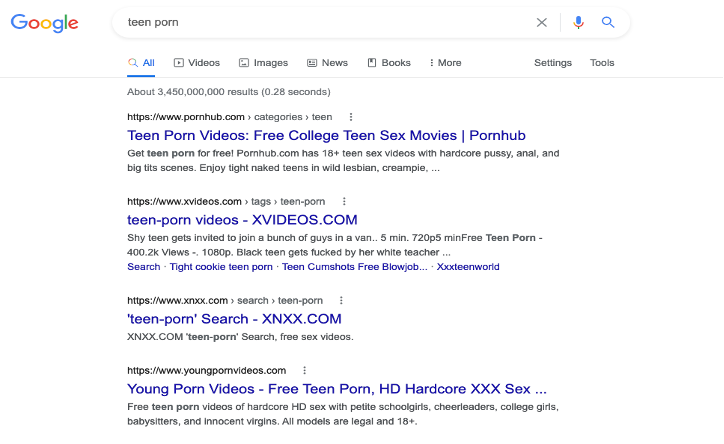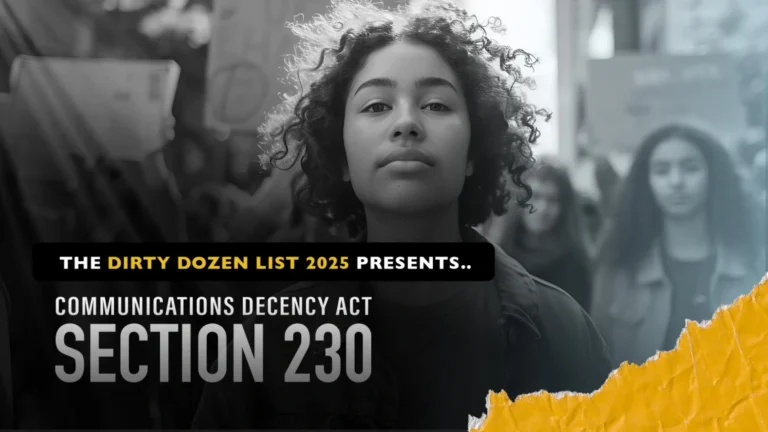As recently as December 2020, when NCOSE researchers conducted a Google search test for “child pornography,” many top results yielded links to hardcore pornography websites, including Pornhub and XVideos—effectively advertising for the world’s largest sexual exploiters that are currently under increased public scrutiny for the proliferation of child sex abuse material on its site.
Two weeks ago NCOSE researchers tried the term “child pornography” again and were thrilled that instead of links to Pornhub or to any other porn sites, the only results on the first 10 pages that we reviewed included information for child safety organizations, news articles, and legislation. In fact, several other search terms that used to direct people to Pornhub (“rape porn,” “incest porn,” and “drugged porn”) no longer do so—though unfortunately they still result in pages and pages of other hardcore porn sites.
Can we call it a “win” that Google no longer drives people looking up “child pornography” to an exploitative website known to profit from images of children being raped? Can we call it a victory when it took a NYT expose, government intervention, and other corporations to cut ties with Pornhub for Google to change its algorithms? Yes. Absolutely! Because when tech mega-giant Google makes any changes—however seemingly “simple” – it has vast ripple effects with the potential to impact hundreds of millions (if not billions) of people. It’s why we celebrate any time Google makes any move toward protecting dignity and actually does “the right thing” as its motto claims.
But it’s too little. And while it’s certainly late, it’s thankfully not too late for Google to stop buttressing an industry that profits from people’s trauma and pain.
While Google has seemingly reduced the number of searches that result in Pornhub showing up on the first page (or even as the first result), several search terms like “teen porn” and “choking porn” are still directing people to Pornhub, to its main competitor Xvideos, and to countless other hardcore pornography sites.
New York Times two-time Pulitzer Prize winning journalist Nick Kristof (whose investigative piece Children of Pornhub published in December 2020 turned the tide against Pornhub and parent company MindGeek) most recently set his scrutinizing sights on XVideos– asking the same question we and other advocates have been demanding for years, “Why Do We Let Corporations Profit from Rape Videos?” Kristof lambasts Google for serving as “a pillar of this sleazy ecosystem, for roughly half the traffic reaching XVideos and XNXX appears to come from Google searches.”
As Google has consistently held the monopoly of search engine market share worldwide – more than 90%, it’s likely Google has assisted countless people in accessing child sex abuse and other violent, illegal material by allowing links to Pornhub, XVideos, and other hardcore pornography sites to show up at the top of the search results page for searches like “child porn.” Studies have shown that the higher the rank on a Search Engine Results Page (SERP), the higher the likelihood users will click on the link, with the first result having the highest clickrate. “Teen porn” and “choking porn” still offer Pornhub as the #1 result. Pornhub and other porn sites rely on the SEO (search engine optimization)—in fact, it’s at the core of their business models to ensure their sites appear on the top page: so much so that even when they are ordered to take down images by lawyers or law enforcement, they leave the titles, tags, and thumbnails up so a Google search can still find them and bring people to Pornhub. Survivors tell us thumbnails showing their abuse are still widely available through a simple Google search of their name – even when the video has been removed from the pornography site.

Why are we letting Big Tech line the pockets of Big Porn, which has monetized the most violent, degrading, racist, and often illegal acts committed against children and vulnerable adults?
NCOSE met with Google executives last February to press on them to change their algorithms in order to stop driving people to hardcore pornography sites and assault users—including young children – with violent, degrading pornographic images. We pressed on them to stop directing people to hardcore pornography for searches like the ones listed above and others, like “slavery porn” or “Asian slave.” Not only did searches related to pornography and prostitution lead to Pornhub and other sites, but scientific and innocent terms like “happy black teen” would populate the screen with images of torture and abuse in under a second, together with links to hardcore porn sites.
Google claimed they couldn’t do more, hiding behind “free speech” to cleanse their hands and justify inaction—even though child pornography and hardcore pornography is not protected by the 1st Amendment. In fact, it’s illegal. Google claimed Pornhub was a “legitimate” site, despite mounting evidence of criminal activity and survivors speaking out and they couldn’t mess with search term algorithms or result positioning (though even at the time we knew they could and did change search result rankings and have more recently curated search content that was potentially harmful on a wide scale such as COVID-19 health information). We continued to push on Google to proactively ensure their products and tools were not buttressing illegal and unethical industries. Soon after NCOSE met with their executives, they did in fact make changes so that scientific terms no longer produces hardcore pornographic images, and that innocent search terms wouldn’t result in hardcore porn links and images (which in and of themselves could cause harm to the viewer—especially minors)
Determining how people receive information and what information they see first places Google in a great position of power—and therefore significant ethical responsibility. Google can and MUST continue to adjust its algorithms so that other search terms like “teen porn” and “choking porn” stop leading to Pornhub.com and that other terms like “rape porn” or “family porn” lead to resources, not videos of sexual assault and incest. Google has showed us they’re able to “do the right thing.” We hope they do so again.


